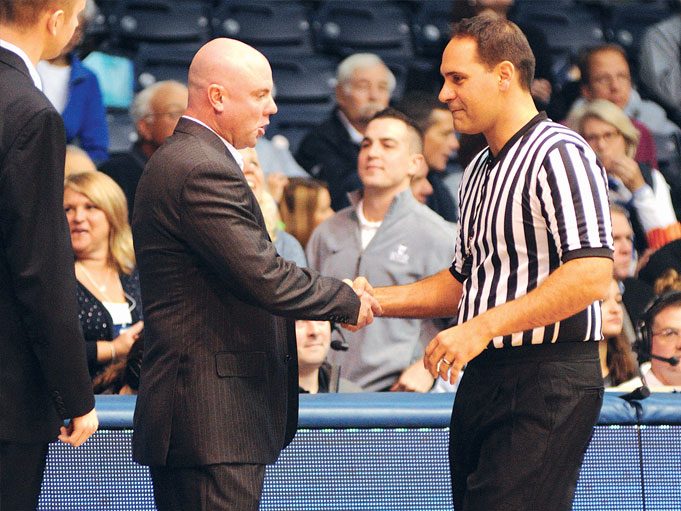There are many activities that are always part of sports contests regardless of the type of sport, the equipment used, or in what venue the game occurs. One of these activities is the traditional initial meeting between the coach and the head official. The nature of the encounter can go a long way in creating a positive relationship that lasts throughout an entire season. When handled well, coaches will feel a sense of trust for the officiating crew. When handled poorly, a long game can become much longer, and a tough call can be tougher to defend.
To get the game off on a positive note, it is imperative that officials master the art of first impressions. And it is far more than simply showing up, smiling and shaking your coach’s hand. Being able to ensure this initial encounter is a positive one, and building credibility for your entire crew, requires several steps.
Be prepared
Lack of preparation is the common cold of officiating. Being ready and doing a little legwork prior to the game can be a big advantage. Preparation for the first interaction with a coach starts when the season schedule is released. Gather as much information as you can about the coach: how long he or she has been with the team, where they are from, teams they’ve worked with in the past, and any other interesting tidbits unique to them as individuals. You never know when this knowledge will come in handy not only during the initial introduction, but in tense game situations as well.
First impressions are lasting impressions
It goes without saying that you should look good. Officials who are unshaven, out of shape and wearing rumpled, stained uniforms are likely to send the message that they simply don’t care about the game at hand. Save the individuality for after the game. Arrive on the field or on the court looking professional, polished and perfect. And don’t forget to make sure your shoes look good!
Shake hands and call the coach by name
Greet the coach with a firm handshake, look them directly in the eye and introduce yourself. It’s preferable and far more professional to refer to the coach as “Coach Davis,” and not by his or her first name. The former sets a tone for professional relationship, the latter can come across as overly familiar and may raise the eyebrow of the opposing coach. Competitive athletics is a small world. And rumors spread quickly when coaches and officials seem to relate on more than a professional level.
Leverage your crew
It is very common for one or more crew members to have worked with a coach in a prior game. Take advantage of that. When you approach the coach for the first time, have the trusted crewmember by your side. The familiarity with another member of the crew will put the coach at ease and help get things off to a good start.
Keep the coach informed
Coaches have literally thousands of things running through their minds at any given time during the game. Keeping a coach apprised, from the beginning, on how many timeouts are left, whether the team is in a penalty situation, and the like, will continually reinforce the positive impression made during the initial handshake. Coaches are more likely to see the officiating crew as assisting their team as opposed to only enforcing rules.
Don’t be afraid of a little humor
Humor can be the great defuser when used sparingly and at the right time. When we laugh it increases our heart rate, blood flow, and reduces levels of stress. A little side joke during a stop in the action increases the emotional attachment individuals feel toward one another and builds better working relationships. If the humor is tasteful and delivered carefully, the results will be positive.
Credibility for an official and the crew is far easier to establish in the opening moments of a contest as opposed to after a controversial call. Take full advantage of the early moments prior to a game for a courteous and professional initial encounter with the coach. Be prepared, look professional and make an informed connection. It will set the tone for a healthy competition where the attention remains on the teams, and not on your crew.
What's Your Call? Leave a Comment:
Note: This article is archival in nature. Rules, interpretations, mechanics, philosophies and other information may or may not be correct for the current year.
This article is the copyright of ©Referee Enterprises, Inc., and may not be republished in whole or in part online, in print or in any capacity without expressed written permission from Referee. The article is made available for educational use by individuals.


















